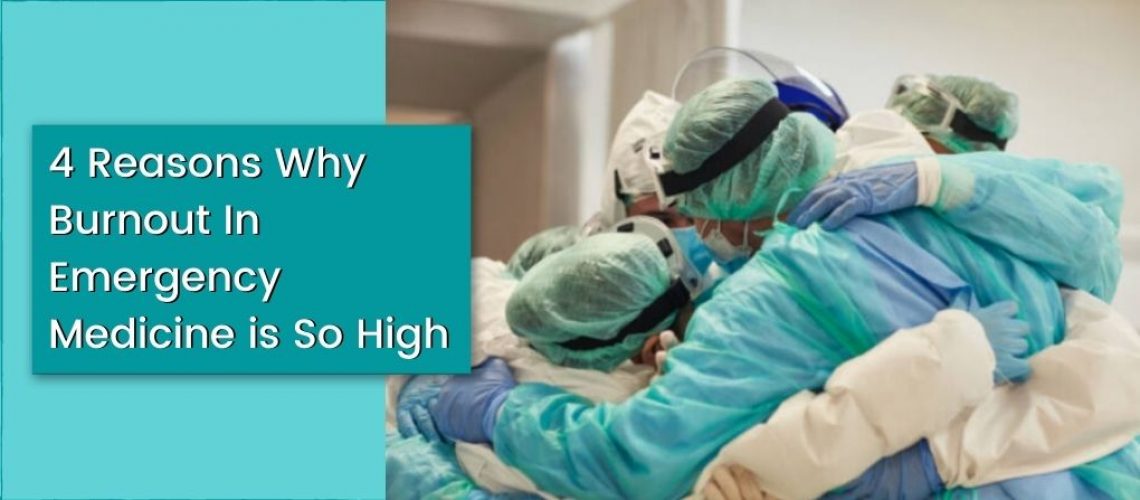Feeling the Burn – Why burnout in the field of emergency medicine is high
According to an article in Annals of Emergency Medicine, emergency medicine physicians are three times more likely to experience burnout than the average physician. Over 7,000 physicians from over two dozen specialties across the United States were surveyed, and there was no contest that emergency medicine was on top – with a staggering 65% of physicians reporting burnout in the field.
Why has the field of emergency medicine taken such a toll on the health of physicians? Here’s my take on why the ER has taken the burn and some tips on how to combat it.
1. Emotional erosion is the most significant part of the burden.
As described in the article cited above – emotional erosion is defined as the transition from compassion to bitterness, cynicism, and anger. As a resident – I’m but a fledgling in this career – and already I have noticed these changes in myself already.
One example would be a patient with drug addiction. You offer them your ear to hear their story, you provide them all the resources needed to help them out with their situation, and you find them falling back into your emergency department again. And again. And again!
It’s the unfortunate part of emergency medicine. Patients are only realistically allotted a small amount of time, and the impact you make on long-term medical changes is often minimal. When you see patients at their worst, without much ability to improve their chronic addiction or pathology – it can become taxing. It’s the reason why certain individuals prefer careers with better patient follow-up, such as internal medicine or neurology.
2. People are going to want things from you – at all hours of the day, even when you’re in the middle of something else.
From nurses, to patients, to other residents and attending physicians, someone is always going to want something from you, and it seems like a never-ending abyss. Nurses will need orders and verification on how you want to proceed on things. A nurse may also advocate for their patient – asking them to be seen soon because they look worse than expected from the medical record’s triage description.
It seems easy – you can write this stuff down on a task list – but as mentioned above, your hands aren’t always free when these requests arise. Juggling everything in your head can become taxing and stressful. My best advice is to take a deep breath and take the time you need to relax – even if it is for a couple of seconds.
This sounds funny, but go to the bathroom when you need to, and eat when you’re hungry! Take care of yourself first so that you have the strength and clarity to take care of others. The world can wait.
3. In the emergency room, things can get…emergent.
Sometimes a patient comes through those doors and is sicker than the ambulance personnel described in a call. You have to be prepared for anything that comes through those doors and work swiftly; as time is often the difference between a good and bad prognosis.
The best thing you can do for your patient is to know your procedures and your emergency medicine principles down cold. There isn’t any time to google or take a quick look at your notes on a procedure or pathology you haven’t seen in a while.
Being prepared will also allow you to approach any patient in a calm, collected manner and won’t send your stress levels sky-high you know you got this!
4. Emergency rooms are built in a way to just incite stress.
Most emergency rooms have open floor plans designed to monitor many patients at once. That being said, as much as you have an eye on your patients, your patients will be scrutinizing you as well. This floor plan allows patients to approach you making a multitude of requests that sidetrack you from your responsibilities. These requests go from extravagant ones – demands to cure their vomiting this very minute, to minor requests such as extra blankets or a hospital sandwich.
Despite how chaotic the emergency department gets, remember that patients have come to the emergency department for a reason. These patients come in their most vulnerable state, wanting aid and answers. Don’t let the stress get to you, and don’t bring it home. Remember that taking care of yourself is still important while you are on the job, and nothing can get done unless you are in the right mindset.
How do you feel about the tips above? Do you think you could handle the stress of the emergency department? Comment below with your thoughts!





